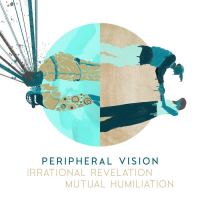Home » Jazz Articles » Album Review » Peripheral Vision: Irrational Revelation And Mutual Humiliation
Peripheral Vision: Irrational Revelation And Mutual Humiliation
At the heart of the album lies the Michael Herring-penned composition "Reconciliation Suite," in which the leader demonstrates the entire range of his double bass, going from large bowing strides to staccato plucking as well as from epic low-frequency waves to the more percussive faculties of the instrument. Herring was given a grant by the Toronto Arts Council to write the suite, which addresses the past and present inequities which persist in the relationship between Indigenous and non-indigenous Canadians. While a notion of reconciliation prevails between the piece's bars and notes, a sense of conflict and even violence is just as apparent throughout.
The remainder of the album is far less conceptual and lets the listener experience lighter moments of bliss. Post-Bopper "For Kent Monkman" invites vibraphonist Michael Davidson to enclose the harmonies of a head that has Thelonious Monk written all over it. Many other cuts are of a more modern variety, due not only to their compositionally modern constitution but moreover to a handful of studio trickery. As on their last outing More Songs About Error And Shame (2018), co-producer Jean Martin, whom the band refers to as its "mad scientist," helps enlarge the quartet's spectrum by adding layers of overdubs to the live-off-the-floor recordings. In that sense, guest appearances by Michael Davidson, Chris Pruden on synth and Craig Harley on organ and Rhodes are dispersed across the different tunes, mostly to atmospheric effect. A number of soloist interventions are able to add dynamism and color to the flow of the music, the synthesizer layers, however, tend to take away from the experience, and fill otherwise meticulously arranged spaces with redundant sound clusters. Well-constructed tunes like "The Fish Who Can't Do Math" or "Brooklyn Bearded," whose earthy production only adds to the songs' harmonious allure, are among such takes, where the underlying synth waves don't serve much of a purpose beyond clouding the image.
However, there are examples in which the prophet synthesizer embellishments bring a coherent and highlighting notion to the composition, as notably represented in "Title Crisis," which sees the double bass' organic foundation in stark contrast to the syncopated square wave lines, supported by unison accompaniment on saxophone. While certainly a matter of personal preference, the band's energy seems captured best at its most naked. "S N A kee SSS" exposes the group in a bare light, filling in the blanks left across the room with thoughtfulness and careful attention for each other. The retreat to minimalism is at its peak in the duo introduction lead between guitar arpeggios and subtle melodic sax-soars on "Neo-Expressionism For Pacifists." From there the song meditates towards quiet exchanges of glances, pondering about mystery and melancholy.
The title of the record builds on the seemingly paradox themes introduced on their last two albums Sheer Tyranny of Will (2015) and More Songs About Error And Shame(2018) and is reflected in the diverse array of sounds and contrasting compositional frames presented across the album. Beyond demonstrating a tight group and skilled compositional minds, Irrational Revelation & Mutual Humiliation elaborates on a wide range of unique moods and atmospheres which deserve to be explored several times over.
Track Listing
CD 1: Whistle Up A Rope; Hanging In, Hanging On, Hanging Out; Reconciliation Suite; For Kent Monkman; The Foish Who Can't Do Math; Brooklyn's Bearded; Man Vs Zafu. CD 2: Title Crisis; Kopfkino; S N A Kee SSS; Neo- Expressionism For Pacifists; N12; Schleudern; Mutual Humiliation Society.
Personnel
Peripheral Vision
band / ensemble / orchestraTrevor Hogg
saxophone, tenorDon Scott
guitar, electricMichael Herring
bass, acousticNick Fraser
drumsAdditional Instrumentation
Michael Davidson: vibraphone (CD 1: tracks 2, 4, 6, 7. CD 2: 3, 6, 7); Craig Harley: organ, Fender Rhodes (CD 1: tracks 1, 6, 7. CD 2: tracks 1, 2); Chris Pruden: Prophet 6 (CD 1: tracks 2, 5, 6, 7. CD 2: tracks 1, 2); Jean Martin: organ bass, synth programming CD 1: track 2; CD 2: track 1).
Album information
Title: Irrational Revelation And Mutual Humiliation | Year Released: 2020 | Record Label: Step3
Tags
About Peripheral Vision
Instrument: Band / ensemble / orchestra
PREVIOUS / NEXT
Support All About Jazz
 All About Jazz has been a pillar of jazz since 1995, championing it as an art form and, more importantly, supporting the musicians who make it. Our enduring commitment has made "AAJ" one of the most culturally important websites of its kind, read by hundreds of thousands of fans, musicians and industry figures every month.
All About Jazz has been a pillar of jazz since 1995, championing it as an art form and, more importantly, supporting the musicians who make it. Our enduring commitment has made "AAJ" one of the most culturally important websites of its kind, read by hundreds of thousands of fans, musicians and industry figures every month.























